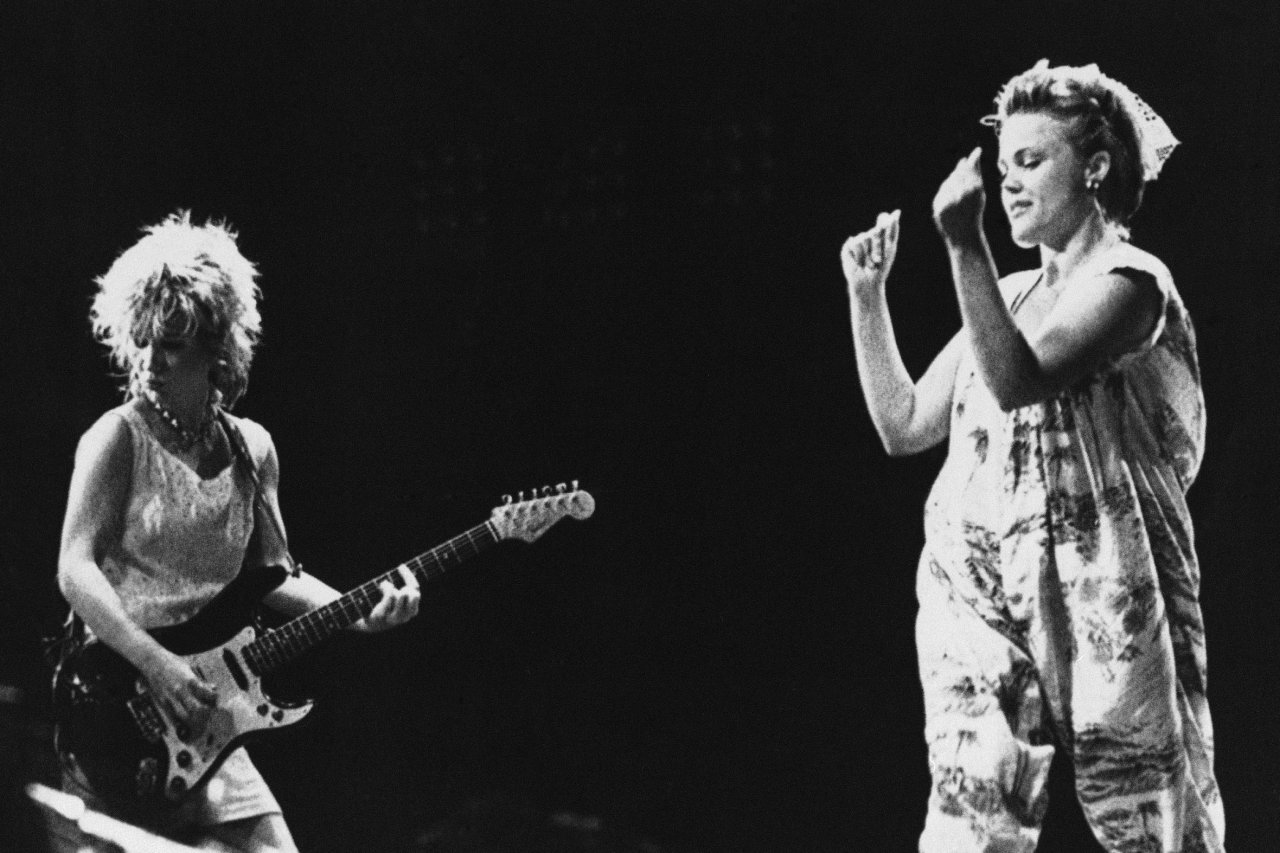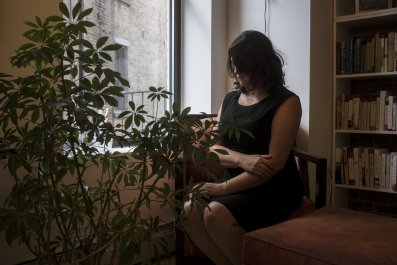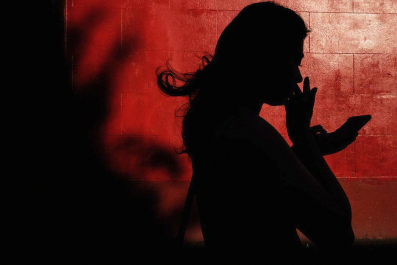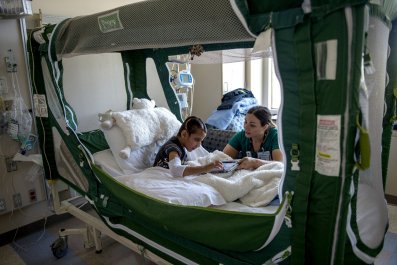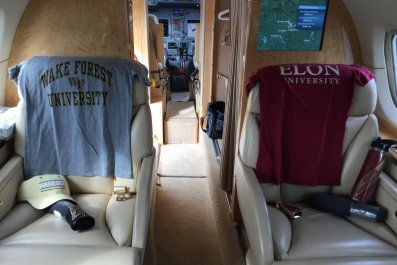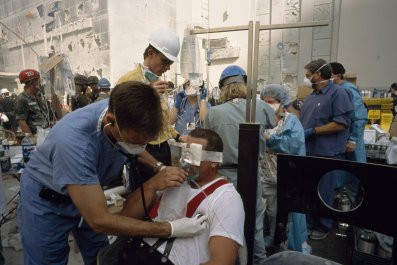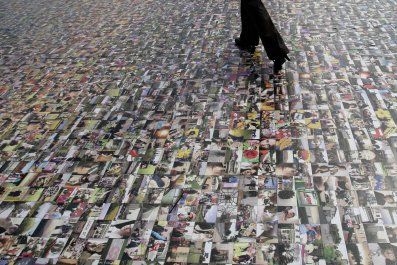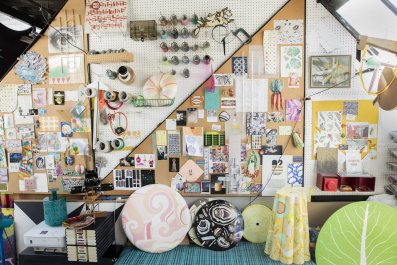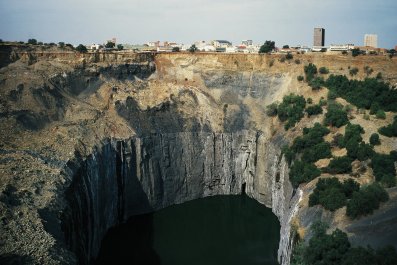During their 19-date farewell tour that has traversed two countries but only one month (August), the Go-Go's have pranced onto stages to Grand Funk Railroad's iconic '70s classic "We're an American Band." Damn straight they are. The only distinctly distaff band to write and record an album (Beauty and the Beat) that spent six weeks at No. 1, the Los Angeles-based quintet has always been a rock 'n' roll symbol for "Nobody puts Baby in a corner."
The Go-Go's play their final show Tuesday night at the Greek Theatre in their hometown of L.A. If you were born in the '60s, that's the sound of time shoveling dirt onto your adolescence. Or, more accurately, it may feel as if the lights are coming on in the basement as someone frantically yells that the cops are at the front door.
In 1983, Cyndi Lauper had a massive hit with "Girls Just Want to Have Fun," but the Go-Go's and their legion of predominantly female teenage fans were already peeing in the bushes at that party, on a quest for another bottle of Bacardi. "We Got the Beat" rose to No. 2 on the charts in 1982, and suddenly suburban girls had an anthem. It would as likely as not be playing in the background as you kneeled in homage to the porcelain god, your best friend holding your hair back off your face.
That the Go-Go's—guitarist Charlotte Caffey, drummer Gina Schock, guitarist and backup vocalist Jane Wiedlin and lead singer Belinda Carlisle (bassist Kathy Valentine had a messy divorce from the band four years ago)—have professed to calling it quits after tonight's performance is bittersweet. In a month when 66-year-old Bruce Springsteen is playing nearly four-hour shows to sold-out stadiums, the Go-Go's, most of whom are in their late 50s, still have a lot of mileage remaining on those tires.
"I'm ready to move forward," Carlisle told Rolling Stone earlier this summer. "The Go-Go's have been together for 38 years. It has to end at some point."
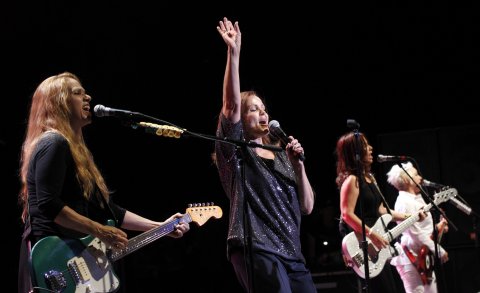
Why? Their music, a fusion of punk evolving into pop that was mislabeled New Wave (how many other early-'80s New Wave bands never used a synthesizer?), is ageless. Like another SoCal quintet, the Beach Boys, whose songs native Angelenos Carlisle and Wiedlin heard on the radio throughout their prepubescence, the Go-Go's wrote infectious songs that captured both the joy and angst of teendom. It's no accident that Cameron Crowe's landmark 1983 film, Fast Times at Ridgemont High, opens with Schock's inimitable drum intro for "We Got the Beat."
"Vacation," the title track from the Go-Go's second album—and the song they've used as their opener on this tour—perfectly captures the life-or-death melodrama of high school romance. "One week without you/Thought I'd forget," sings Carlisle. "Two weeks without you/And I still haven't gotten over you yet." Two weeks. That's one-third of a marking period!
The beauty (and the beat) of the Go-Go's is that they were not molded by a record executive or found in auditions for the new Mickey Mouse Club. They rose up from the same overflowing-toilet punk scene that produced such bands as the Runaways, X and Black Flag. In the late 1970s, Carlisle, who grew up in California's Newbury Park and was a high school cheerleader (she was, like, a Valley girl...totally!), became seduced by rock 'n' roll. On a stalking expedition at the Beverly Hilton in hopes of meeting and getting an autograph (selfies were still decades away) from Queen lead singer Freddie Mercury, she met a pair of burgeoning punk rockers, Darby Crash and Pat Smear (the latter was later a frequent collaborator on guitar with Nirvana). The trio, along with a girlfriend of Carlisle's, would go on to form the seminal L.A. punk band the Germs.
Carlisle, then a drummer known as Dottie Danger, immersed herself in L.A.'s flourishing punk music scene. It served as an antidote to the bell-bottom soft rock (i.e., flaccid rock) that had dominated the airwaves in her mid-'70s high school years. Growing up in an era whose nadir was scraped in 1974, when "Feelings" was a top 10 hit, incited Carlisle to scratch that rebellious itch even more.
A bout with mononucleosis prevented Carlisle from ever taking the stage with the Germs. She then met Wiedlin, another regular in the L.A. punk scene, and then the other members were added, with a replacement or two taking place before the final lineup solidified. The Go-Go's were not L.A.'s first all-female punk outfit to make noise—that would be the Runaways, fronted by Lita Ford and Joan Jett. Unlike the Runaways, though, the Go-Go's wrote songs that emerged from the underground and became radio-friendly hits. There was never an issue of the Go-Go's winning the war of the photo shoots, of being more sexually appealing: They simply wrote irresistible sub-three-minute pop songs (not unlike the early Beach Boys and Beatles).
It may sound like heresy to mention the Go-Go's in the same sentence with the Beach Boys or the Fab Four, but similarities cross the gender lines. Like those two bands in their early years, the Go-Go's wrote short, simple upbeat songs with chord progressions that you'd learn in your first week of classes at the School of Rock. But those tunes contained catchy hooks that not only captured but somewhat created a zeitgeist. People may have surfed before Brian Wilson learned to play the piano, just as teenage girls hung out in packs and drank too much before the Go-Go's trashed hotel rooms. It's just that now both subcultures had a playlist.
Like the Beatles, the Go-Go's went abroad for a year before they ever hit the charts, to tour and hone their chops as a band (the Beatles played in Germany, while the Go-Go's toured England in support of Madness and the Specials). Without that dues-paying experience, the band would never have gone beyond being Sunset Strip favorites.
When the Go-Go's returned from the U.K. and embarked on a tour with the Police in late 1981, they were less known outside the 310 area code than Moon Unit Zappa. Then their singles "Our Lips Are Sealed" and "We Got the Beat" were released, the latter rising to No. 2 on the Billboard charts. Before long, the Go-Go's had the No. 1 album in the nation while they were still the undercard on the tour.
The Police's Ghost in the Machine "dropped back to No. 6, and we were opening for them," Carlisle told Rolling Stone. "Sting came into our dressing room with a bottle of champagne and said congratulations. [The Police] were really gracious about it."
The Go-Go's, who put out three albums between 1981 and 1985, were neither soul sisters nor the sole sisters of rock. Debbie Harry of Blondie and Chrissie Hynde of the Pretenders preceded them on the charts by a year or three, while Pat Benatar was a contemporary. They, too, were legit musicians and rockers, but all three fronted male rock bands. They were den mothers, to a degree. The Go-Go's were a sorority, albeit one that likely would have been booted off campus before the end of rush week.
Back when the ladies first appeared on the cover of Rolling Stone, in the summer of 1982, Wiedlin, then 24, told the magazine, "I can't see myself hopping around the stage in a miniskirt when I'm 40." So, yes, they've exceeded her expectations in terms of longevity.
The Greek Theatre finale, taking place just a mile or so northeast (and 38 years later) from where the band first played sets at the Masque and Whiskey a Go Go clubs, should not be the last show the Go-Go's play together. That should come at the Rock and Roll Hall of Fame induction ceremony, but there's just one problem: The Go-Go's have never even been nominated for induction into the Rock and Roll Hall of Fame ("Pay no mind to what they say/Doesn't matter anyway").
In the 34 years since Beauty and the Beat shot to No. 1, no other female rock group has even come close to charting that high. Yes, the Bangles and Bananarama swam in the wake of the Go-Go's' success (or was it the wake created by the five of them water-skiing on the album cover of Vacation?), but they never topped the charts. And those groups never appeared to be having as much fun—few bands have—as the five young women who once appeared on the cover of Rolling Stone wearing only giddy smiles and their underwear.
It was a character from another Cameron Crowe film, Almost Famous, who also appeared—at least in the movie—on a Rolling Stone cover. In one scene, standing on the roof of a home at a raucous high school party, intoxicated by both booze and fame, Russell Hammond (Billy Crudup) proclaims, "I am a golden god!" What happens when you truncate those final two words to their first two letters? "I am a Go-Go!"
They were always more than the most contagious and successful all-female rock band ever. The Go-Go's, God bless them, were coming to your town, to help you party down.



